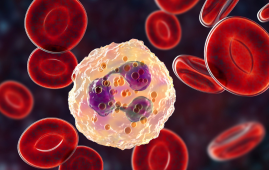

Immune checkpoint inhibitors have changed treatment for patients with advanced lung cancer over the last decade, allowing many to live longer lives and improving overall disease survival. However, an essential question remains unanswered: how long should a patient with advanced non-small cell lung cancer (NSCLC) who receives immunotherapy as part of their initial treatment stay on medication?
A new retrospective cohort study published today in JAMA Oncology and presented at the 2023 American Society of Clinical Oncology (ASCO) Annual Meeting (Abstract 9101) by researchers from Penn Medicine’s Abramson Cancer Center suggests that patients should be able to discontinue immunotherapy treatment after two years if their cancer has not progressed.
There was no statistically significant difference in overall survival between individuals who ceased treatment after two years and those who continued treatment permanently, according to the researchers.
“We hope this data provides reassurance that stopping immunotherapy treatment at two years is a valid treatment strategy that does not seem to compromise overall survival,” said lead author Lova Sun, MD, an assistant professor of Hematology-Oncology at the Perelman School of Medicine at University of Pennsylvania. “In the absence of definitive prospective data about the duration of therapy—which will take years to accumulate—our goal was to use real-world observational data to provide guidance on this important clinical question.”
Because pivotal clinical trials employed varying treatment durations, and as medicines have been licensed and become generally available, many patients have prolonged medication beyond the one to two years examined in clinical trials, the proper length of treatment remains an unresolved subject. The longer a patient receives treatment, the greater the health-care costs become—for both the patient and the health-care system—and the danger of immune-related adverse effects remains.
The researchers examined de-identified data from a national electronic health record that included individuals with advanced NSCLC treated in both academic and community settings in this study. Only one in five of the 1,091 patients who received an immune checkpoint inhibitor as part of their initial therapy (either alone or in combination with chemotherapy) and whose cancer did not progress after two years were considered the “fixed duration” group for this analysis.
The vast majority of those who maintained treatment for more than two years were classified as “indefinite duration.”
The team reviewed the data and discovered that the two groups had equal overall survival probabilities: 79% for fixed length and 81% for indefinite duration.
Ultimately, the field is still on the leading edge of determining the most appropriate duration for these immunotherapies that have been so effective for patients with advanced lung cancer,” said senior author Charu Aggarwal, MD, MPH, the Leslye M. Heisler Associate Professor for Lung Cancer Excellence in Hematology-Oncology at Penn. “This study provides important data that we hope will help patients feel less worried about potential risks of coming off therapy and more confident if they decide to discontinue treatment after two years.”
more recommended stories
 Silica Nanomatrix Boosts Dendritic Cell Cancer Therapy
Silica Nanomatrix Boosts Dendritic Cell Cancer TherapyKey Points Summary Researchers developed a.
 Vagus Nerve and Cardiac Aging: New Heart Study
Vagus Nerve and Cardiac Aging: New Heart StudyKey Takeaways for Healthcare Professionals Preserving.
 Cognitive Distraction From Conversation While Driving
Cognitive Distraction From Conversation While DrivingKey Takeaways (Quick Summary) Talking, not.
 Fat-Regulating Enzyme Offers New Target for Obesity
Fat-Regulating Enzyme Offers New Target for ObesityKey Highlights (Quick Summary) Researchers identified.
 Spatial Computing Explains How Brain Organizes Cognition
Spatial Computing Explains How Brain Organizes CognitionKey Takeaways (Quick Summary) MIT researchers.
 Gestational Diabetes Risk Identified by Blood Metabolites
Gestational Diabetes Risk Identified by Blood MetabolitesKey Takeaways (Quick Summary for Clinicians).
 Phage Therapy Study Reveals RNA-Based Infection Control
Phage Therapy Study Reveals RNA-Based Infection ControlKey Takeaways (Quick Summary) Researchers uncovered.
 Pelvic Floor Disorders: Treatable Yet Often Ignored
Pelvic Floor Disorders: Treatable Yet Often IgnoredKey Takeaways (Quick Summary) Pelvic floor.
 Urine-Based microRNA Aging Clock Predicts Biological Age
Urine-Based microRNA Aging Clock Predicts Biological AgeKey Takeaways (Quick Summary) Researchers developed.
 Circadian Control of Neutrophils in Myocardial Infarction
Circadian Control of Neutrophils in Myocardial InfarctionKey Takeaways for HCPs Neutrophil activity.

Leave a Comment